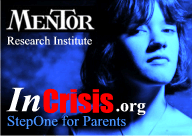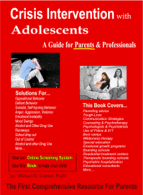There are a lot of great programs
in the United States. There is also a growing body of research and
professional opinion that emotional growth, therapeutic school programs
and wilderness programs are more effective
than traditional treatment approaches. Parents and professionals
are referring to and exploring these options when counseling, therapy
and even private schools are failing.
There are many excellent alternatives and options for parents who are
dealing with oppositional, defiant and youth at risk. But there are also
less optimistic realities. Virtually every alternative program, school and health care
institution will face challenges at one time or another. But there is a good
chance that you will have a good experience with just about any program you select
provided that you
research that program fully and you choose wisely. For some parents, the challenge
will be to insure the best possible experience and the best possible
long term outcome for the cost. Programs can be expensive. Not everyone
can afford $80,000 a year. Not everyone needs a program that cost that
much. We hope the following information will help you
decide if consultation is something you should consider.
Most parents need options and a
comprehensive plan
Some parents need help understanding and developing comprehensive
intervention options that are economical, appropriate to the child's
level of need and based on values that parents
consider important in raising their child. Developing a complete
intervention is more economical and produces a better outcome. Some
children need only one intervention. Other need several. A comprehensive intervention might include
one or more of the following,
- crisis stabilization ($700 to $3000)
- clinical, behavioral and educational needs assessment ($600 to
$3,200)
- preventative intervention ($3000 to $20,000)
- primary intervention ($8000 to $23,000)
- therapeutic boarding school ($22,000 to $80,000 per year)
- transition home or school environment ($12,000 to $26,000)
- return to home environment with follow-up support ($1,000 to
$8,000 per year)
Parents need to find the best
program and interventions for their child.
There is no such thing as the best program. Some program are great for
some children and ineffective with others. Programs are also not in the business of providing consultation or recommending the best program for a
particular child or family. Programs attempt to screen out students who are clearly not appropriate for
their program. But screening out children is not the same as matching a
child and family with a program. Some programs will refer a family to another program that is
owned or within their own network of programs. However, a network of
programs is not necessarily better and the range of services
they offer are not
necessarily more effective. Bigger programs are not better than smaller
programs. Programs are very good at highlighting their
strengths. Programs normally do not give you information regarding the
weaknesses in their program.
Parents need informed and unbiased recommendations.
Programs offer opinions and recommendations that may be
self-serving in some cases. Some programs are outright deceptive and
misleading as part of their admission process. For instance, no program will put you in touch with a parent who has
complained or filed a law
suit against a
program for negligence, inappropriate billing practices, injury or
breach of contract. The fact that a program's actions were not proven
criminal does not mean they were not negligent or did not break the law.
Parents of a program graduate can end up recommending a program that was
in fact unstable, unethical, unsafe or operating illegally. It is
a simple fact that some children will benefit from their experiences in
spite of the errors and mistakes, or even episodes of abuse and neglect
on the part of a program. Abusive programs do not hurt every single
child - but they may
hurt far more than necessary to reduce costs. There are programs
operated outside the United States that torture children.
Parents need to understand the strengths, weaknesses and track
record of a program.
There are some very ethical, professional and honest people working
in program and clinical services as well as admissions and marketing.
But parents should keep in mind that programs are in no way obligated to
provide complete information. There are no ethical requirements placed
on programs. Programs are in business and they are not required by law
to provide full and complete information that you would expect. The
admission-marketing staff (referring to their selves as counselors
or Directors) may not be licensed professionals and they may not have the clinical experience necessary to offer a clinical or
psychological opinion. Some
staff in programs may be Directors or counselors in title only and
they may have no other qualifications.
A licensed professional could lose their license if they knowingly
provided false and misleading information that affects a child's
treatment. Unlicensed admission staff are not obligated to provide you
with the best information that would allow you to make the best
decisions. That doesn't make them necessarily bad people, but it does
mean you are forced to trust them. Keep in mind
that some admission staff may be paid on an incentive basis and they are
trained to sell you the program.
Parents need to understand exactly how a program will impact their
child.
Programs are very different. Parents often have great difficulty
fully understanding
how programs can or should operate.
There is no substitute for experience. Children are also unique and no
single program is right for all children. Parent values are
also a critical part in selecting a
program.
Programs are not the same even when they sound similar to the
inexperienced
person. Parents need to know exactly how a program operates before they
entrust their child to a program. The fact that a program is licensed is
not enough to insure safety or success. Programs structure their use of consequences,
incentives, rewards, choice, challenges, ordeals, social bonding, as
well as leadership and communication skills training differently. Some
programs rely heavily on punishment and depravation while others refuse to
use such practices. These
differences alone can have a dramatically different impact on a child. Parents need to be fully informed before they make a decision to
entrust their child to the care of others.
A Word of Caution.
There are a few intervention programs who rely on semi-independent
marketing organizations that conduct admissions and market several programs
heavily on
the internet. These organizations are reportedly under great
pressure to secure a high number of admissions each month. Staff may
be deceptive, outright liars and omit important information when speaking with parents and professionals in order to secure an
admission. The general public has no means to fully investigate the
assurances, promises and lofty claims presented by an
admission-marketing professional. Parents generally do not have enough
time to investigate the history of a program or network of programs to
make a truly informed choice.


